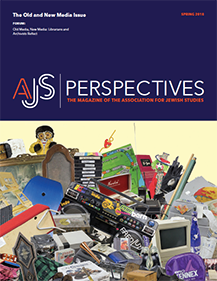
We might say that digital devices, connected to each other through the Internet, are analogous to that that third book of life. These devices contain knowledge about us and bind us together into a kind of community, but they leave the question of our future status largely unclear. One challenge of living in the contemporary moment, then, involves confronting the consequences of our online media presence. We are each given the power to behave as media companies, as the producers and editors of content. In short, we are subjects, objects, and consumers. Thinking about our digital lives means reflecting on the challenges of living together in a world where media play a pervasive role in our moral orientation.
The history of media technologies is a history of humans developing tools in an attempt to play God. These technologies and devices allow us to manipulate time and space, by generating representations that inspire behavior and retaining memories for future reflection and evaluation; and they allow us to disseminate knowledge across space, and, in turn, to see across distances. Perhaps this is why religious organizations have so often been enthusiastic adopters of new communications technologies, packaged with unprecedented invasions of privacy as part of a culture of “sharing.” from the codex to radio to Twitter. With devices that offer high-quality photographs, easy-to-use editing software, and simple ways to “get the word out,” our modern-day media now provide us with the capabilities once reserved for large media companies. Two of the more prominent activities of digital culture—following and searching—serve as reminders that media technologies contribute to our sense of transcendence alongside a sense of immanence. Our biggest worries about the misuse of power enabled by these devices and technologies— whether by peddlers of propaganda, by snooping eyes at the NSA, or by cyberbullies—serve as powerful reminders of the way these tools can easily be used for “ungodly” purposes.
Our digital platforms promise connection, promotion, and dissemination, but they grant these in exchange for extensive surveillance, invasive advertising, and a loss of privacy. We might regard this trade-off as the consummation of two dreams that were long in the making. In exchange for us to finally have our own television station, directing our own news network, or programming our own film festival, companies like Facebook, Twitter, and Netflix are able to finally reach the dream of “knowing their audience” by collecting more information about us in more ways than ever before. This union was sealed through what can be seen in retrospect as a remarkable leap of faith on our part as individuals: a belief that with access to and possession of our collected and shared pasts these companies would act responsibly. That confidence is hardly based on fact, as many of us remain largely out of touch with the ways our data is being used. Despite the repeated stories of sensitive material leaking out from “secure” storage, we retain a belief that somehow our information is being handled responsibly. Millions of users continue to share even more personal information with Silicon Valley as they simultaneously complain about its misuses, a symbol of the conflicted relationship we have with platforms that provide us with unprecedented publicity packaged with unprecedented invasions of privacy as part of a culture of “sharing.”
Our online behavior also raises serious ethical questions. The expansion of communicative capabilities did not come with an equally expansive set, or sense, of responsibilities and rights. As we transformed into our own media companies, questions of individual or social responsibility for our digital behaviors have been left largely for the market to sort out. However, in perusing penitential prayers from the High Holy Days liturgy, like Al Heyt and Avinu Malkenu, one can easily appreciate the communicative acts that sit at the root of our digital sins: rushing to judgment, spreading false information, hateful speech, boastfulness, spreading gossip, “foolish talk,” and lying and deception. We once used these terms to critique major media corporations for selling salaciousness and spectacle in return for advertising revenues. Now those same behaviors are part of the pitch we use to deliver those selfsame advertisers to our social networks in return for “likes,” shares, and retweets.
Atoning in the Internet age differs from atonement in earlier eras not because of the actions but because of the afterlife of digital transgression. A slip of the tongue that once circulated locally now goes globally viral. An embarrassing photograph that once made the rounds at someone’s school or place of work can now find a place in the Internet’s darker corners or in a Google image search, forever. Facebook’s “Year in Review” function reminds users of things from their past with the help of algorithms that may or may not do an accurate job of historical reconstruction. Everyone from politicians to prospective job candidates knows that the Internet “never forgets,” placing them in state of limbo, unsure as to when a previous tweet or inappropriate gesture may come back to haunt them, with no real way of knowing when and how the need for atonement will be required.
Our collective naiveté may come at a cost. In his recent book World without Mind, Franklin Foer predicts that we are on the verge of experiencing “the big one,” a hack of such magnitude that would reveal our personal habits and predilections in ways that could significantly alter human relations. The European Union recently recognized a “right to be forgotten” that allows its citizens the power to request that material deemed “inadequate, irrelevant, or out-of-date” be delisted from search engine results. Among the reasons for implementing this policy was a desire to reproduce a sense of what exists in the offline world to online spaces. Another was to preempt unnecessary suffering due to past behavior, particularly for young people. These efforts are a more sober way of dealing with the realities of digital communication, at a distance from Foer’s dystopian predictions; and they also mark a productive start to reining in powerful digital platforms, to bringing these higher powers back into a regulatory orbit by devising technical solutions that are grounded—however imprecisely—on principles of human rights. Left for us to determine, however, are the bigger questions of how to live with each other at a time when our abilities to be everywhere, to pass judgment on others, and for our pasts to be shared and circulated are a part of who we are. We must attend to the questions of how to behave against a backdrop of permanent inscription in what we might call the Facebook of Life. Perhaps we might consider things that we can do without media technologies. That would include things like loving, listening, and forgiving those people who are closest to us as part of our everyday life.

